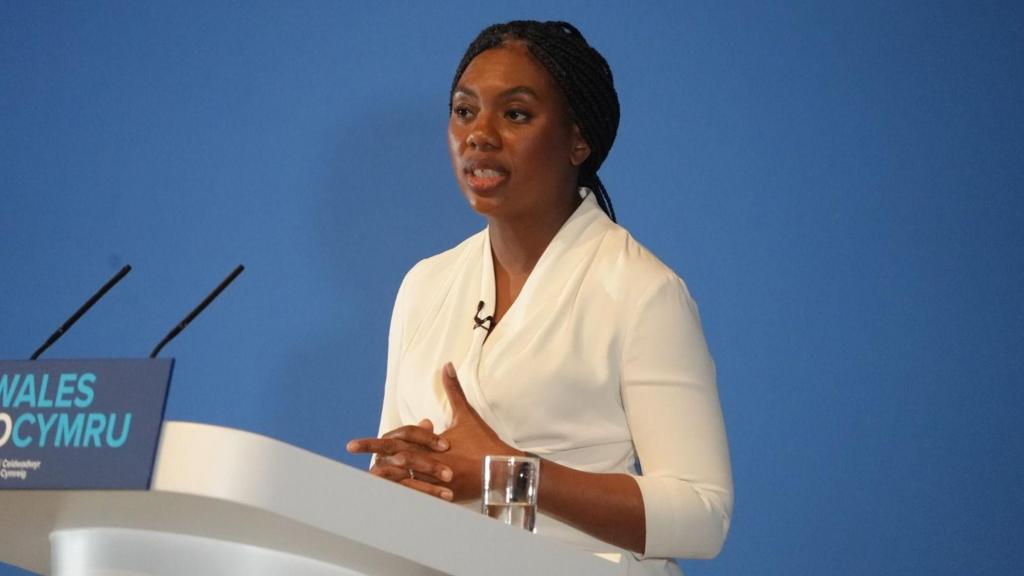UK Conservative Party leader Kemi Badenoch and Welsh Conservative leader Darren Millar have avoided definitively ruling out potential coalitions with Plaid Cymru or Reform UK following next year’s Welsh elections.
Current projections suggest a multi-party agreement will likely be necessary to form a Welsh government, as achieving a majority is improbable.
On the opening day of the Welsh Conservative conference in Llangollen, Senedd leader Darren Millar stated his party’s willingness to collaborate with any party to oust the Labour government.
Kemi Badenoch, who previously rejected a UK-level alliance with Reform UK, acknowledged the possibility of post-election negotiations but dismissed the topic as a distraction.
Current polling places the Conservatives in fourth place, trailing Labour, Reform UK, and Plaid Cymru, ahead of the May election. Their previous general election saw them lose all Welsh parliamentary seats.
Millar described his party, holding 16 Senedd seats, as a “government in waiting,” while Badenoch urged members to actively oppose Plaid Cymru and Reform UK.
Collaboration between Labour and either the Conservatives or Reform UK is unlikely. Plaid Cymru has excluded Reform UK from potential partnerships but remains open to discussions with Labour and the Conservatives.
Any deal involving Plaid Cymru or Reform UK would likely spark internal controversy within the Conservative party, particularly considering Plaid Cymru’s pro-independence stance.
On BBC Radio Wales Breakfast, Millar affirmed, “I’m prepared to work with anybody to get rid of this failing Labour government.”
When pressed about cooperation with Reform UK, he reiterated, “I will work with anybody to get rid of this dreadful Welsh Labour government. I’ll say no more than that,” offering a similar response regarding Plaid Cymru.
In a BBC Wales interview, Badenoch responded to a question about potential alliances with Plaid Cymru and Reform UK, stating: “We’re not here to talk about deals, we’re here to talk about what we are going to do to fix Wales.”
She emphasized that preemptive coalition talks distract from focusing on policy solutions for the Welsh people and pledged full party focus on maximizing Conservative seat wins.
While acknowledging the possibility of future discussions, Badenoch stressed that such conversations were currently premature and a diversion from the party’s core objectives.
Reform UK leader Nigel Farage expressed his party’s openness to collaborations for government formation in Wales.
Badenoch’s conference speech characterized Plaid Cymru and Reform UK as employing “identity politics,” criticizing Labour’s approach and suggesting Plaid Cymru and Reform UK benefit from Labour’s current Westminster power.
“It’s the politics of identity they are playing and we need to fight back. Reform is not the answer, Labour is not the answer. All these other parties are a flavour of the same thing. They tell people what they think they want to hear because they’re trying to help themselves.”
Badenoch described last year’s election results as “devastating” and noted that recent English local elections highlight the party’s ongoing challenges. She declared Wales as the starting point for the party’s comeback.
In her speech, she mistakenly referred to Welsh politicians as “MSPs” (Members of the Scottish Parliament) before correcting herself, attributing it to a verbal lapse.
Millar earlier acknowledged the “bruising” effects of last year’s general election defeat, emphasizing the party’s commitment to rebuilding public trust and presenting themselves as the most viable alternative to the current Labour government.
He underscored the party’s commitment to “freedom, choice, and personal responsibility,” framing poor poll numbers not as discouraging but as motivation for greater effort. New party policies, including reducing NHS wait times to one year and reinstating home economics in schools, were also unveiled.
Millar highlighted these policies as evidence of the party’s readiness to govern. The conference follows internal disagreements over candidate selection, with concerns raised about potential limitations on candidates who oppose devolution.
By Gareth Lewis, BBC Wales political editor
While Badenoch avoided discussing post-election deals directly, she did not rule them out. Both she and Millar appear to view such alliances as their best chance of participating in the next Welsh government.
However, unlike Millar’s more proactive stance on potential alliances, Badenoch’s hesitation reflects the broader political implications of such decisions. Her rejection of a Westminster pact with Reform UK underscores the potential threat to the Tories, and a Plaid Cymru alliance would present a significant challenge to party unity.
Her careful language is noteworthy; while Senedd politicians often view such alliances as standard practice, Westminster politicians often view them more negatively.
BBC News interviewed young party members at the conference, highlighting the party’s promise to reduce NHS treatment wait times to a year.
Millar acknowledged public frustrations with devolution.
First Minister Mark Drakeford discussed legislation strengthening the Welsh language’s role in education.
Reform UK’s leader discussed his lack of long-term plans to lead the party in Wales.

